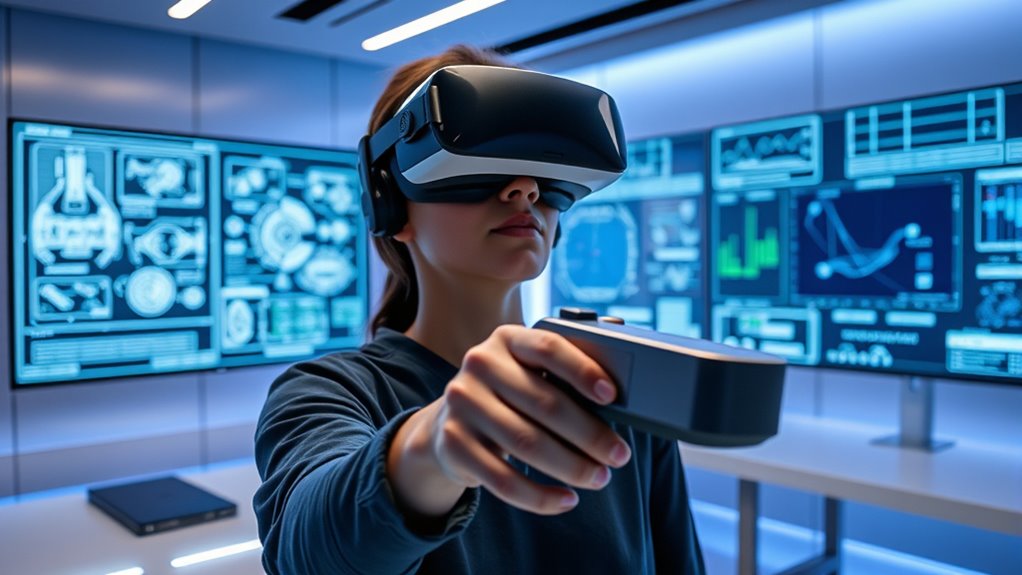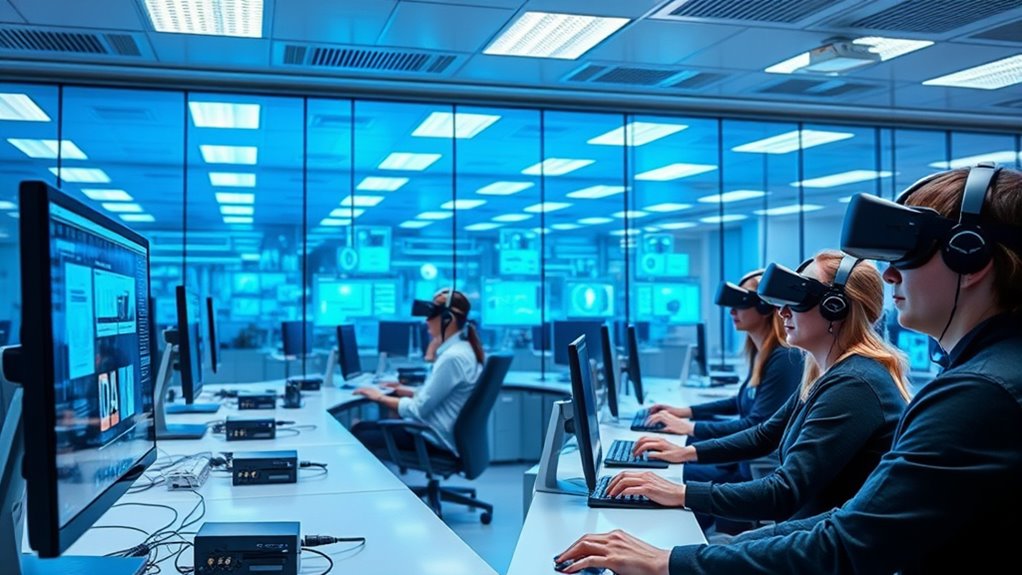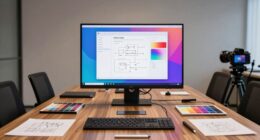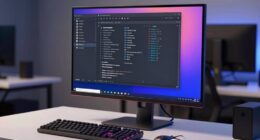VR training labs are revolutionizing hands-on QA learning by immersing you in realistic environments where you can practice tasks safely and interactively. You’ll develop skills faster, gain confidence, and improve retention through active engagement and immediate feedback. The technology allows customization to match your specific needs, helping you troubleshoot and master techniques repeatedly. As VR continues evolving, it promises even more sophisticated experiences, making this a game-changer for quality assurance professionals enthusiastic to stay ahead.
Key Takeaways
- VR training labs offer realistic, interactive environments that enhance skill development and decision-making without real-world risks.
- They enable scenario customization and repeated practice, improving mastery and troubleshooting skills across industries.
- Data collection during VR sessions allows personalized feedback, accelerating learning and identifying areas for improvement.
- VR training increases engagement, motivation, and confidence, leading to better retention and real-world performance.
- As technology advances, VR labs will become more sophisticated, making hands-on QA training more effective and accessible worldwide.

Have you ever wondered how virtual reality is transforming the way we train and prepare for real-world tasks? With VR training labs, you’re stepping into a world where immersive simulations play a vital role in developing your skills. These labs aren’t just about watching or reading; they immerse you directly into scenarios that mimic real-life environments, giving you a sense of presence and engagement that traditional training methods can’t match. When you participate in immersive simulations, you’re actively practicing procedures, making decisions, and experiencing outcomes without any risk. This hands-on approach accelerates skill development by allowing you to learn from mistakes in a controlled setting, boosting your confidence and competence before facing actual challenges.
VR training labs leverage cutting-edge technology to create realistic, interactive environments tailored to various industries—whether it’s manufacturing, healthcare, aviation, or emergency response. Instead of reading manuals or watching videos, you’re in a virtual space where you can manipulate objects, navigate complex scenarios, and respond to unexpected problems. This active engagement helps solidify your understanding and muscle memory, leading to better retention. As you repeat tasks in these simulations, you refine your techniques, identify areas for improvement, and build muscle memory that translates seamlessly into real-world performance. The immersive nature of VR makes training more engaging and less monotonous, encouraging you to stay focused and motivated.
VR training creates realistic, interactive environments that enhance skill retention and engagement across industries.
Skill development in VR training labs is also highly adaptable. You can customize scenarios to match your specific needs, challenge levels, or learning pace. For example, if you’re training for equipment repair, VR can simulate different fault conditions, allowing you to troubleshoot and practice repairs multiple times. This flexibility ensures that you’re not just passively learning but actively mastering skills in a risk-free environment. The immediate feedback provided during these simulations helps you understand what you’re doing well and where to improve, speeding up your learning curve. Additionally, the use of VR in training can incorporate Glycolic Acid Benefits to improve skin health in related healthcare scenarios, emphasizing comprehensive preparation.
Moreover, the data collected during VR training sessions offers valuable insights into your progress. Trainers and supervisors can analyze your actions, pinpoint weaknesses, and tailor subsequent training to address those gaps. This personalized approach makes your learning more efficient and targeted. As VR technology advances, these immersive training environments will become even more sophisticated, providing more realistic scenarios and greater opportunities for hands-on skill development. Ultimately, VR training labs are revolutionizing how you prepare for real-world tasks, making training more effective, engaging, and accessible than ever before.
Top picks for "train labs future"
Open Amazon search results for this keyword.
As an affiliate, we earn on qualifying purchases.
Frequently Asked Questions
What Are the Cost Implications of Implementing VR Training Labs?
When considering VR training labs, you should do a thorough cost analysis to understand the initial expenses and ongoing costs. While setup can be costly, it often reduces expenses related to physical materials and travel over time. Implementing VR training helps with expense management by offering scalable, reusable modules. However, you need to weigh hardware, software, and maintenance costs against the long-term benefits to determine if it’s a worthwhile investment for your organization.
How Do VR Labs Adapt to Different Industries’ QA Needs?
You might think one-size-fits-all solutions work, but VR labs actually excel at industry customization, tailoring experiences to unique QA needs. They adapt seamlessly, ensuring skills transfer specific to each sector’s challenges. Ironically, what seems like a generic tool becomes highly specialized, giving you practical, hands-on training regardless of your industry. This flexibility makes VR labs a powerful asset for any field aiming to improve quality assurance through targeted, immersive learning.
What Are the Technical Requirements for Setting up VR Training Environments?
To set up a VR training environment, you need a solid hardware setup, including VR headsets, motion controllers, and compatible computers. Ensure seamless software integration by installing the right VR platform and training applications. You also have to take into account space requirements for movement and safety, along with network connectivity for updates and data sync. Properly configuring hardware and software guarantees an immersive, effective training experience for your QA teams.
How Do VR Training Outcomes Compare to Traditional Hands-On Methods?
Think of comparing VR training outcomes to traditional methods like apples and oranges. VR provides immersive engagement that captures your attention and boosts skill retention better than hands-on practice alone. You’ll find that virtual environments allow for safe, repeatable experiences, helping learners master skills faster. While traditional methods are valuable, VR’s interactive nature often results in improved understanding and longer-lasting knowledge, making it a powerful tool for modern training.
What Future Technological Advancements Could Enhance VR QA Training?
You might wonder what future tech could boost VR QA training. Augmented reality can overlay real-world data, making training more immersive and practical. AI integration can personalize learning, adapt scenarios in real time, and improve feedback. These advancements will make VR training more realistic, effective, and engaging, helping you develop skills faster and more confidently. Embracing these innovations will shape the next generation of hands-on QA learning experiences.
Conclusion
You see, VR training labs revolutionize how you learn, how you practice, and how you master QA skills. They make hands-on experience accessible, immersive, and safe, all at once. You can simulate real-world scenarios, repeat tasks without risk, and build confidence with every session. Embrace this technology to sharpen your skills, boost your efficiency, and stay ahead in the ever-evolving world of quality assurance. VR isn’t just the future—it’s your future.








